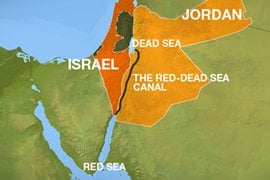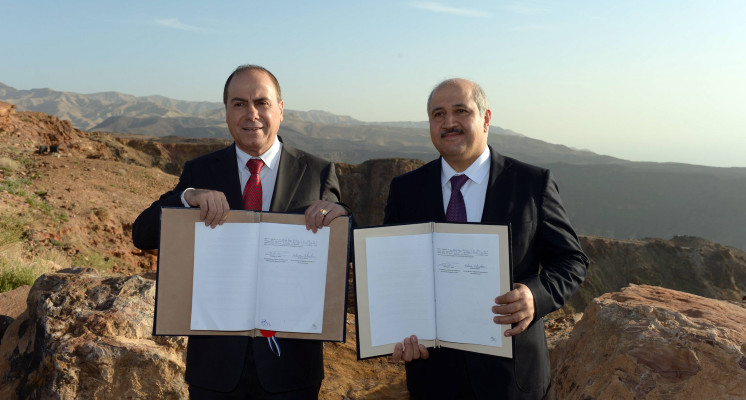The Red-Dead Project will help save the Dead Sea while providing much-needed fresh water to Israel, Jordan and the Palestinian Authority-run territories.
By World Israel News Staff

(globalresearch.ca)
Israel and Jordan signed a historic final agreement to construct a pipeline connecting the Red Sea with the Dead Sea. The so-called “Red-Dead” project will help save the Dead Sea while providing much-needed fresh water to Israel, Jordan and the Palestinian-administered territories.
Under the $900 million agreement, a desalination plant will be established in the Jordanian port city of Aqaba on the Red Sea. The fresh water produced will be distributed among Israelis, Jordanians and Palestinians. From there, a pipeline will transport 100 million cubic meters of leftover brine annually to the Dead Sea, which would otherwise be expected to dry out by 2050 due to diversion of water from the Jordan River. Initially, 300 million cubic meters will be pumped from the Red Sea annually, but this volume is expected to reach 2 billion cubic meters when the project is completed.
Israeli Energy and Water Resources Minister Silvan Shalom, who signed the agreement in Amman, described it as “the most significant agreement since the peace treaty with Jordan.” He told economic news outlet TheMarker, “This is the culmination of a productive cooperation between the nations, that will help restore the Dead Sea, and provide solutions to Jordan’s water problems.”

Signing the Agreement.
Jordanian Water and Irrigation Minister Hazem Nasser said, “The deal will help satisfy Jordan’s increasing water needs for development.”
The agreement is the end result of negotiations following a letter of intent signed by Israel, Jordan and the Palestinian Authority in 2013 after a World Bank study determined that the Red-Dead project was feasible. The pipeline will be laid on the Jordanian side of the border at a cost of $250 million. Construction will begin in a year and a half and should be completed within three years. The European Union and the World Bank are expected to fund part of the project.
Water has historically been a core issue in Israel’s negotiations with both Jordan and the PA. The aridity of the region has made the distribution of water from the Jordan River as well as from aquifers an issue of survival. However, advances in desalinating seawater should eventually render the question of water irrelevant.
Some environmental groups have opposed the Red-Dead project due to concern that it will disrupt the delicate ecosystem of the Dead Sea.





